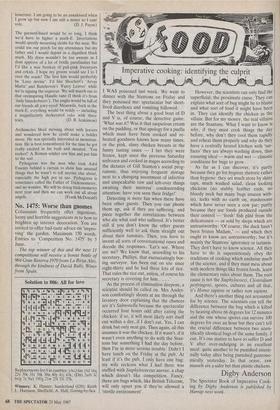Imperative cooking: identifying the culprit
I WAS poisoned last week. We went to dinner with the Stantons on Friday and they poisoned me: spectacular but short- lived diarrhoea and vomiting followed.
The best thing about a good bout of D and V is, of course, the detective game: 'What was it? Was it that suspicious cream on the pudding, or that apology for a paella which must have been cooked and re- heated goodness knows how many times, or the pink, slimy chicken breasts in the funny tasting sauce — I bet they were frozen, kept since the previous Saturday unfrozen and cooked in stages according to the dictates of Gill Stanton's social prog- ramme, thus enjoying frequent storage next to a changing assortment of infective and unspeakable raw and left-over things awaiting their mistress' condescending attention: have you seen their fridge!'
Detecting is more fun when there have been other guests. Then you can phone them up, ask if they are suffering, and piece together the correlations between who ate what and who suffered. It's better still if you don't know the other guests sufficiently well to ask them straight out about their tummies. Then, you have to invent all sorts of conversational ruses and decode the responses. 'Let's see. Where are we? We know that, according to his secretary, Phillips, that excruciatingly bor- ing surveyor, has been out on site since eight-thirty and he had three lots of rice. That rules the rice out, unless, of course his secretary is covering for him . • .
As the process of elimination deepens, a scientist should be called on. Mrs Ander- son comfortingly shouts at me through the lavatory door explaining that the chances are it's Salmonella because the spectacular occurred four hours odd after eating the chicken: if so, it will most likely sort itself out within a day, if I don't eat. Yes, I can drink but only neat gin. Then again, all this assumes it was the chicken. If it wasn't, if it wasn't even anything to do with the Stan- tons but something I had the day before, then I'm in more serious trouble. Didn't I have lunch on the Friday at the pub. At least if it's the pub, I only have one bug: my wife reckons what I had there was stuffed with Staphylococcus aureus, a chap which doesn't like competition. Fancy, there are bugs which, like British Telecom, will only upset you if they're allowed a 'sterile environment'. However, the scientists can only find the superficial, the proximate cause. They can explain what sort of bug might be to blame and what sort of food it might have been in. They can identify the chicken as the villain. But for my money, the real villains are the Stantons. What I want to know is why, if they must cook things the day before, why don't they cool them rapidly and reheat them properly and why do they have a centrally heated kitchen with 'sur- faces' they are always washing down, thus ensuring ideal — warm and wet — climatic conditions for bugs to grow.
As far as I can discover, it's partly because they go for hygiene rhetoric rather than hygiene: they set much store by shiny taps, much washed salad, clean looking chickens (no stubby feather ends, no bloody neck but many bugs unseen with- in), leeks with no earth on, mushrooms which have never seen a cow pat; partly because they use foods produced outside their control — 'fresh' fish pâté from the delicatessen — or sold by shops which are untrustworthy: 'Of course, the duck hasn't been frozen Madam,' — and which they ought to know are untrustworthy; but it's mainly the Stantons' ignorance or laziness. They don't have to know science. All they have to do is superstitiously obey the traditions of cooking which enshrine much of the science, and if they must mess about with modern things like frozen foods, learn the elementary rules about them. The root cause is not the Staphylococci, Clostridium perfringens, spores, cultures and all that, it's Homo sapiens or rather non sapiens.
And there's another thing not accounted for by science. The scientists can tell the difference between the bug which is killed by heating above 66 degrees for 12 minutes and the one whose spores can survive 100 degrees for over an hour but they can't tell the crucial difference between two scien- tifically identical bugs of the same family. I can. It's one matter to have to suffer D and V after over-indulging in an excellent meal: quite another to be punished intesti- nally today after being punished gastrono- mically yesterday. In that sense, raw mussels are a safer bet than plastic chickens.
Digby Anderson
The Spectator Book of Imperative Cook- ing by Digby Anderson is published by Harrap next week.









































































 Previous page
Previous page